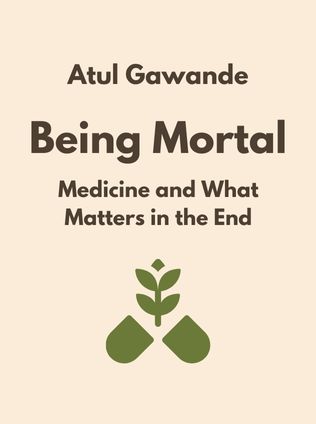
Being Mortal
Medicine and What Matters in the End
By Atul Gawande
Published 10/2014
About the Author
Atul Gawande, a renowned surgeon, writer, and public health researcher, was born in Brooklyn, New York, to Indian immigrant parents. His unique blend of medical expertise and deep humanistic insight has made him one of the most influential voices in modern healthcare. Gawande pursued his medical degree at Harvard Medical School and complemented it with a Master’s in Public Health from the Harvard School of Public Health. Throughout his career, he has been dedicated to improving healthcare practices, especially in the context of aging, dying, and the human experience of mortality.
Gawande’s work as a surgeon provides him with a firsthand view of the medical system’s strengths and limitations, which he has eloquently critiqued in his writings. His ability to merge clinical observation with compelling narratives has earned him widespread recognition, including being a staff writer for The New Yorker and the author of several bestselling books. "Being Mortal" is perhaps his most impactful work, delving into the complex issues surrounding end-of-life care and the need to reframe how we approach aging and death.
Main Idea
"Being Mortal" is a profound exploration of how modern society deals with aging and death. Gawande argues that the medical system, while advanced in many ways, often fails to address the most critical aspects of a person’s final days—dignity, autonomy, and the quality of life. He asserts that the focus on prolonging life at all costs can sometimes lead to more suffering rather than comfort. Gawande calls for a shift in priorities from merely extending life to ensuring that the end of life is meaningful and aligned with the individual’s values and wishes.
Central to his argument is the idea that aging and dying should not be medicalized processes devoid of humanity. Instead, they should be viewed as natural parts of life that require a holistic approach, integrating medical care with emotional, social, and spiritual support. Gawande challenges both the healthcare system and society at large to rethink how we care for the elderly and the terminally ill, advocating for more personalized and compassionate care that respects the individual's life choices.
Table of Contents
- Introduction: The Problem with Aging and Death in Modern Medicine
- Chapter 1: The Way We Age Now
- Chapter 2: Things Fall Apart
- Chapter 3: Dependence
- Chapter 4: Assisted Living
- Chapter 5: A Better Life
- Chapter 6: Letting Go
- Chapter 7: Hard Conversations
- Chapter 8: Courage
- Conclusion: The End of Life and the Necessity of Reform
Introduction: The Problem with Aging and Death in Modern Medicine
Gawande opens with a critical examination of the modern medical approach to aging and death, pointing out that while medical advancements have extended life expectancy, they have also led to a disconnection from the natural process of dying. He argues that the medical field’s focus on curing disease often comes at the expense of patients’ overall well-being, especially in the final stages of life. Gawande notes that this medicalization of aging has led to a scenario where the elderly are often subjected to invasive procedures that prolong life but do not necessarily improve the quality of that life.
Sign up for FREE and get access to 1,400+ books summaries.
You May Also Like
The Subtle Art of Not Giving a F*ck
A Counterintuitive Approach to Living a Good Life
By Mark MansonHow To Win Friends and Influence People
The All-Time Classic Manual Of People Skills
By Dale CarnegieFreakonomics
A Rogue Economist Explores the Hidden Side of Everything
By Steven D. Levitt and Stephen J. DubnerQuiet: The Power of Introverts
The Power of Introverts in a World That Can't Stop Talking
By Susan Cain



















